Jordan Wright
January 25, 2020
Making its DC premiere at Arena Stage under Carey Perloff’s astute direction, A Thousand Splendid Suns brings to life Khaled Hosseini’s poignant and powerful novel of Afghanistan in 1992. After years of bombings by Russian and Taliban forces, creating a crisis of unimaginable destitution and deprivation, Laila’s family is forced to make a decision – whether to flee to the refugee camps of Pakistan or survive amid the ruins of Kabul.
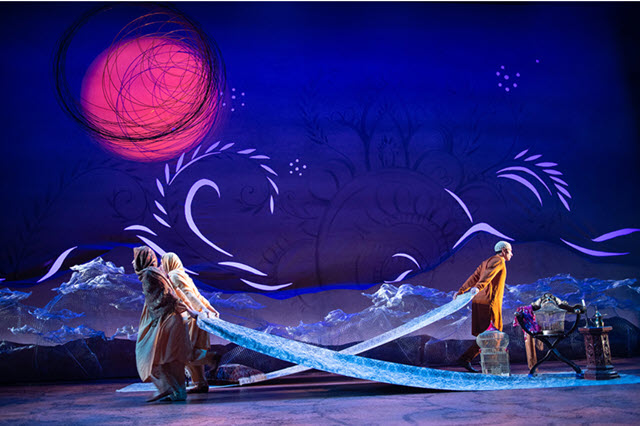
(L to R) Nikita Tewani (Aziza/Afoon/Girl), Sarah Corey (Ensemble) and Antoine Yared (Tariq/Driver) in A Thousand Splendid Suns running January 17 through March 1, 2020 at Arena Stage at the Mead Center for American Theater. Photo by Margot Schulman.
In Kabul no one is safe from harm, especially the women, who under Taliban rule must follow the most oppressive laws dictated by the local government, laws that forbid women to go outside without a male relative, to paint their nails, the enforced wearing of burkas, the closing of schools for women, that a woman is the property of her husband, and many more inhumane restrictions. I’d forgotten that I had read Hosseini’s book until the point in the play of Laila’s enforced imprisonment by the man who had rescued the teenager from the rubble and now was beholden to him as his second wife. A cruel master to the two women, Rasheed denies Laila, and his first wife, Mariam, any freedoms and the two are treated as indentured servants in his household. At first Mariam is jealous of this younger, prettier, educated girl, but eventually the women bond over Laila’s baby, and Laila devises a plan for Mariam, herself, and the children to escape to Peshawar.
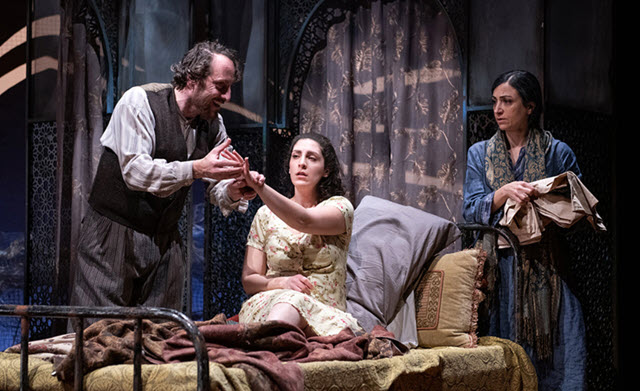
(L to R) Haysam Kadri (Rasheed), Mirian Katrib (Laila) and Hend Ayoub (Mariam). Photo by Margot Schulman.
Mariam’s own story is another tragic tale that begins to unfold in flashbacks of her youth, when her mother, raped by a man of means who abandons her and their child, sends them off to live a life of deprivation in a mountaintop shack. Any child who is illegitimate in Afghan society is an outcast and Wakil and his wife cannot accept Mariam in their household. “Like a compass that always points North, a man’s accusing finger always points to a woman,” her mother warns Mariam whose desire to pursue an education is thwarted by Taliban rule.
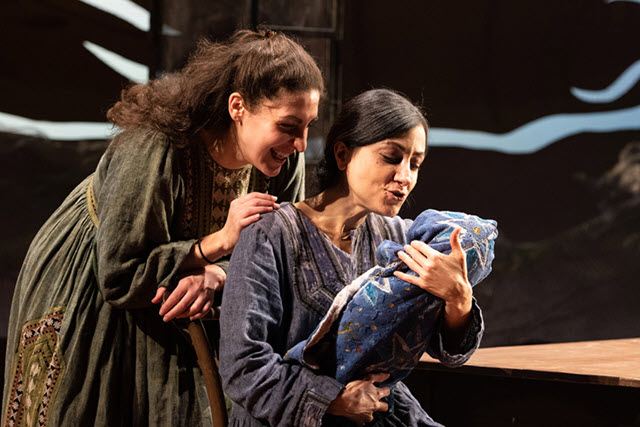
(L to R) Mirian Katrib (Laila) and Hend Ayoub (Mariam). Photo by Margot Schulman.
The drama closely follows the book’s plot, that is to say that the violence portrayed in the book is not glossed over, and there are explosive scenes that caused the audience to audibly wince. On opening night Supreme Court Justice Samuel Alito was sitting behind Ruth Bader Ginsburg. The Afghan Ambassador was also in the audience. I couldn’t help wondering how differently each of them would process the most viscerally violent scenes and the raw depiction of male-dominated Afghan society. Thankfully, in this story, there is some redemption. A secret love story that plays out alongside the women’s suffering is resolved at the end.
I can’t say enough about how important this play is in bringing to light the horror of daily life under the Taliban. In some Third World countries this sadistic subjugation of women is still accepted practice.
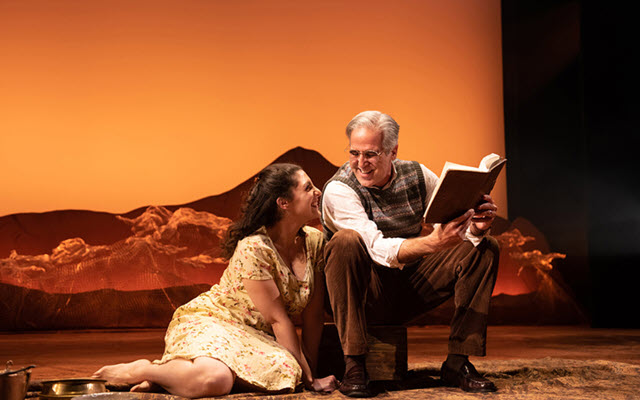
(L to R) Mirian Katrib (Laila) and Joseph Kamal (Babi/Zaman/Interrogator). Photo by Margot Schulman.
Spellbinding and wondrously acted, it is highly recommended though not suitable for children.
With Hend Ayoub as Mariam; Mirian Katrib as Laila; Haysam Kadri as Rasheed; Antoine Yared as Tariq/Driver; Lanna Joffrey as Fariba/Nana; Joseph Kamal as Babi/Zaman/Interrogator; Jason Kapoor as Wakil; Antoine Yared as Tariq/Driver; Nikita Tewani as Aziza; Ravi Mampara and Justin Xavier Poydras as Zalmai; Sarah Corey, Ensemble; and Yousof Sultani, Ensemble.
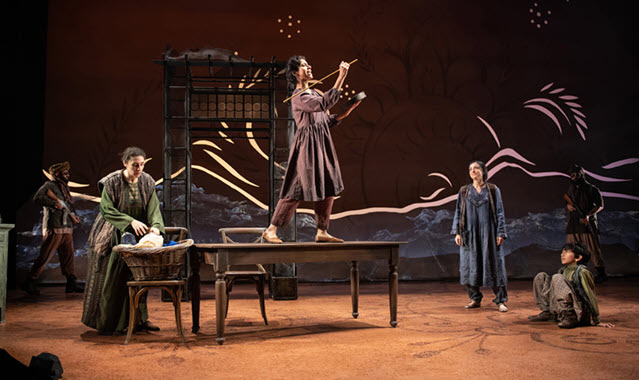
(L to R) Mirian Katrib (Laila), Nikita Tewani (Aziza/Afoon/Girl), Hend Ayoub (Mariam) and Ravi Mampara (Zalmai). Photo by Margot Schulman.
By Ursula Rani Sarma; based on the book by Khaled Hosseini; Choreographed by Stephen Buescher; Original Music written and performed by David Coulter; Set Design by Ken MacDonald; Costume Design by Linda Cho; Lighting Design by Robert Wierzel; and Sound Design by Jake Rodriguez.
Through March 1st at Arena Stage, 1101 Sixth St., SE, Washington, DC 20024. For tickets and information call 202.488.3300 or visit www.ArenaStage.org.